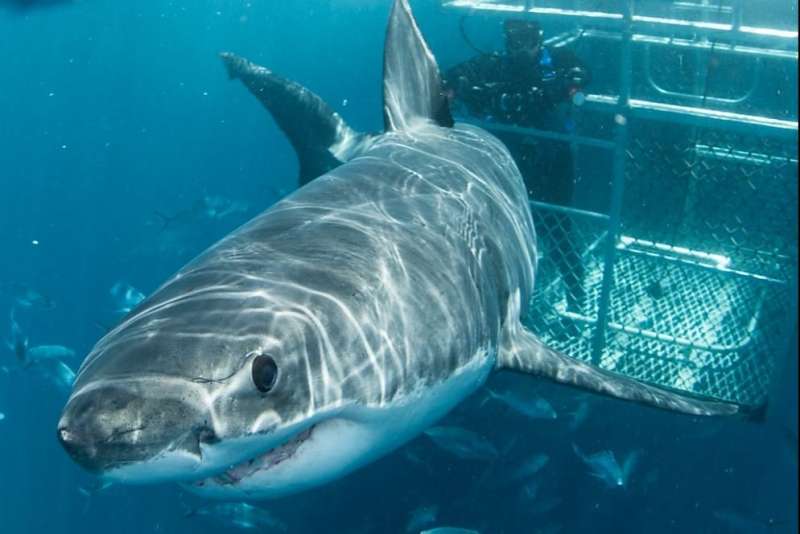A close encounter during a cage shark diving experience. Credit: Andrew Fox
Cage diving with an apex predator such as a white shark is a high adrenaline experience, but it can also change participants' views on shark conservation once they're back on dry land.
A new study has found that wildlife tourism has the potential to make participants enthusiastic wildlife ambassadors. The paper, Turning wildlife experiences into conservation action: Can white shark cage-dive tourism influence conservation behaviour?, by marine biology and tourism experts at Southern Cross University and Flinders has been published in Marine Policy.
The researchers, including marine scientist Associate Professor Charlie Huveneers who leads the Southern Shark Ecology Group at Flinders University, investigated the attitudes and environmental behaviour of 136 tourists following their white shark cage-dive experience at the Neptune Islands Group Marine Park in South Australia.
While dolphins and whales are often the focus of marine wildlife tourism and activism, a more commonly held negative perception of sharks has meant that conservation for sharks received little public support.
However, public attitudes towards sharks have begun to change, with an increased level of interest and awareness of the scale of threats to global shark populations. In particular, continued change in public perception can be accelerated through the marine tourism industry.
"Sharks play important ecological roles in marine ecosystems, and improving human perception is key to increasing conservation awareness and behaviour," Associate Professor Huveneers says.
Once considered a disadvantage to coastal tourism, sharks are now considered an important attraction at dive sites around the world. Exposing tourists to sharks in their natural environment has considerable potential to enhance a participant's knowledge, attitude and behaviour towards sharks, and support their conservation.
Responses to an online survey revealed a significant increase in participation for seven of the eight conservation-related behaviours explored, and a positive shift in participants' understanding, awareness, attitudes and concern for sharks following their cage diving experience. These results suggest that emotional engagement during the tour is associated with enhancing participants' knowledge and attitude towards sharks.
Many tourists' perception of sharks is positively enhanced as a result of them participating in the cage dive, according to research project leader Ph.D. candidate Kirin Apps, from the School of Environmental Science and Engineering at Southern Cross University.
"Many are surprised by their experience," says Ms Apps. "They come with the idea that it's going to be a scary experience, but they get out of the water and use words such as beautiful, peaceful and majestic; words they wouldn't usually associate with sharks.
"There was a lot of respect for these animals once they saw them in the wild. Their emotional connection through engagement was one of the big things that changed their ideas about sharks. Having people speak positively about sharks is beneficial to conservation."
More information: Kirin Apps et al. Turning wildlife experiences into conservation action: Can white shark cage-dive tourism influence conservation behaviour?, Marine Policy (2017). DOI: 10.1016/j.marpol.2017.11.024
Journal information: Marine Policy
Provided by Flinders University
























